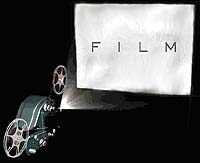  Tips
on Film Viewing - Part One: Tips
on Film Viewing - Part One:
Watching a film's moving image,
other than just for pure entertainment's sake, is usually enhanced
by viewing it with an informed awareness of how a film works,
and with some understanding, skill and background training in
the elements of the craft of film-making. Each film viewer or
movie-goer should strive to be a 'critic' (in the best and most
general sense of the word) and be receptive to the full experience.
 Viewing a film critically and attentively means
to realize cinema with greater thought and awareness, and to
elevate one's celluloid experience. It also means possessing
an informed knowledge of the film's complex and dense 'language,'
its conventions, codes, symbols, cinematic attributes, and other
factors. Viewing a film critically and attentively means
to realize cinema with greater thought and awareness, and to
elevate one's celluloid experience. It also means possessing
an informed knowledge of the film's complex and dense 'language,'
its conventions, codes, symbols, cinematic attributes, and other
factors.
Before investigating a film more thoroughly for a serious
film buff, read about various aspects of film-making, including film
terms essential to know in order to fully understand
the 'language' of film. (See this site's illustrated Film
Terms Glossary for definitions of many terms used here.)
This short list is provided for the average movie-goer
to stimulate thought about film, and help the viewer to become
cinematically-literate. It gives helpful hints on the art of
reading, analyzing, watching, critically viewing, and deconstructing
a film (to take apart the film's components and interpret how
it was all intentionally assembled together). Anyone can learn
the language, techniques, and structure of cinema of both the
past and present. The Internet Movie DataBase (www.imdb.com)
is always a useful resource for factual information about films.
See also this site's Film Search page
for other helpful film resources. Here
are some simple suggestions, as a first step, for viewing a film
intelligently: |
 Choose
an Appropriate Film to View: Choose
an Appropriate Film to View:
Usually, watch a film that is worth your while.
If you are in a film studies class, you will probably be studying
some of the classics of cinema, rather than watching the latest
popcorn film, action film or blockbuster.
This exhaustive list of various steps is not intended
for fluffy, entertaining films that are to be watched for pure
enjoyment's sake. However, make sure to choose a film from any
of the wide selection of genre films
available so that you can experience the entire spectrum of different
types of films.
 Know
The Basics: Know
The Basics:
Note the following basic facts (see some of these factors further
below):
- film's title (and alternate titles or production
titles, if any)
- year of release
- main stars/performers
- director
- studio
- rating
- running time
- genre classification
- brief summary
- tagline(s)
- awards
 Identify
Studio: Identify
Studio:
       
Know the studio responsible for the
film. Was it made by a major studio, a minor studio, or an independent?
Why was the film made?
 Note
Film's Rating: Note
Film's Rating: 
Consider the film's official MPAA rating (G, PG, PG-13, R, NC-17,
or unrated). See Film
Ratings Guide.
 Was
there any controversy surrounding the film's rating? Was
there any controversy surrounding the film's rating?
 Classify
Film's Genre: Classify
Film's Genre:
Decide on the film's principal type, its genre and sub-genre categories
(such as action, adventure, musical, comedy, etc.). If it's a hybrid (a
combination of two or more genres), what are they?
How does the film fit (or not fit) into its conventional,
recognizable classifications?
 Write
One-Liner Summary: Write
One-Liner Summary:
If you were to write a short 'one-liner' summary to describe the
film (often called a synopsis or film treatment),
what would it be?
 Classify
Type of Film: Classify
Type of Film:
Read about whether the film is a sequel, prequel, re-make,
a spoof, an homage film, etc.
Are there other versions of the film's story or tale?
 Briefly
Evaluate Production Values: Briefly
Evaluate Production Values:
Does the film have one or the other:
- high-production values (with a glossy and expensive
look)
- low-production values (it's a low-budget, amateurish,
B-film)
 Look
Up Awards and Honors: Look
Up Awards and Honors:
 Find
out about the film's major awards (i.e., the Academy
Awards ), nominations, or other honors bestowed upon
it. Find
out about the film's major awards (i.e., the Academy
Awards ), nominations, or other honors bestowed upon
it.
|
 Have
a Second Viewing: [Note: Not all films deserve such
scrutiny.] Have
a Second Viewing: [Note: Not all films deserve such
scrutiny.]
Watch a deserving film more than once, and preferably with others
so that the experience may be discussed afterwards.
During the first viewing:
- become familiar with the basic plot, main characters,
important action, etc.
- in other words, acquire a brief synopsis of
its story including time and place, the characters and their
interactions, and the film's main themes without taking notes
The second time around:
- pay more detailed attention to what is being
projected
- take notes and make observations
- begin to think in a more concentrated way about
the film's structure, acting, directing, the camera shots and
angles, etc.
 Turn
on Dialogue Subtitles: Turn
on Dialogue Subtitles:
Use the closed-caption feature with DVDs, in order to better understand
the dialogue.
[Note: Oftentimes, the subtitles are abbreviated
or modified and do not match the actual spoken words.]
 Examine
Title and Credits: Examine
Title and Credits:
Consider a film's main title and its opening credits:
- Why was the specific title chosen (were there
any other alternatives considered?), and how do the credits
establish a tone or mood?
- What are the first sounds and images in the
film?
- Can you find any motifs in the credits?
- Do the end credits have any unusual features
(e.g., out-takes, gags, additional footage, etc.).
[Note: Up until the 1950s, films had a very
set format for the credits: (1) credits at the start, (2) a "The
End" title card following the film, and (3) a cast list
with character names. Recently, most films immediately begin
with a plot sequence, with 'opening' credits ("main title")
super-imposed over them after a few minutes, and extensive rolling
'full credits' ("end title"), usually white text on
a black background, after the film concludes.]
 Use
Freeze-Frames: Use
Freeze-Frames:
Be prepared to pause (the freeze technique allows one to 'see'
how everything is positioned in a frame) and to replay various
scenes, shots, or sequences.
 Listen
Carefully to the Soundtrack: Listen
Carefully to the Soundtrack:
Prepare to listen carefully to the film's soundtrack and how the
music, songs, and score enhance the actions of the characters and
the film's mood.
 Watch
Film Extras: Watch
Film Extras:
Play the added special features of most DVDs, including audio commentary,
the original theatrical trailer or teaser, deleted scenes, and
other related material.
 Maintain
Objectivity: Maintain
Objectivity:
Maintain objectivity to what is being presented, without pre-judging
the film based on what you've heard about it (from critics or friends),
your preconceptions about the actors in it, the reputation of the
director, etc.
 Overall
Quality: Overall
Quality:
View the film as a whole, realizing that it is composed
of the sum of all of its parts. Some individual parts
may be 'great' but the film must hold together, and
be cohesive and meaningful in its entirety.
|


